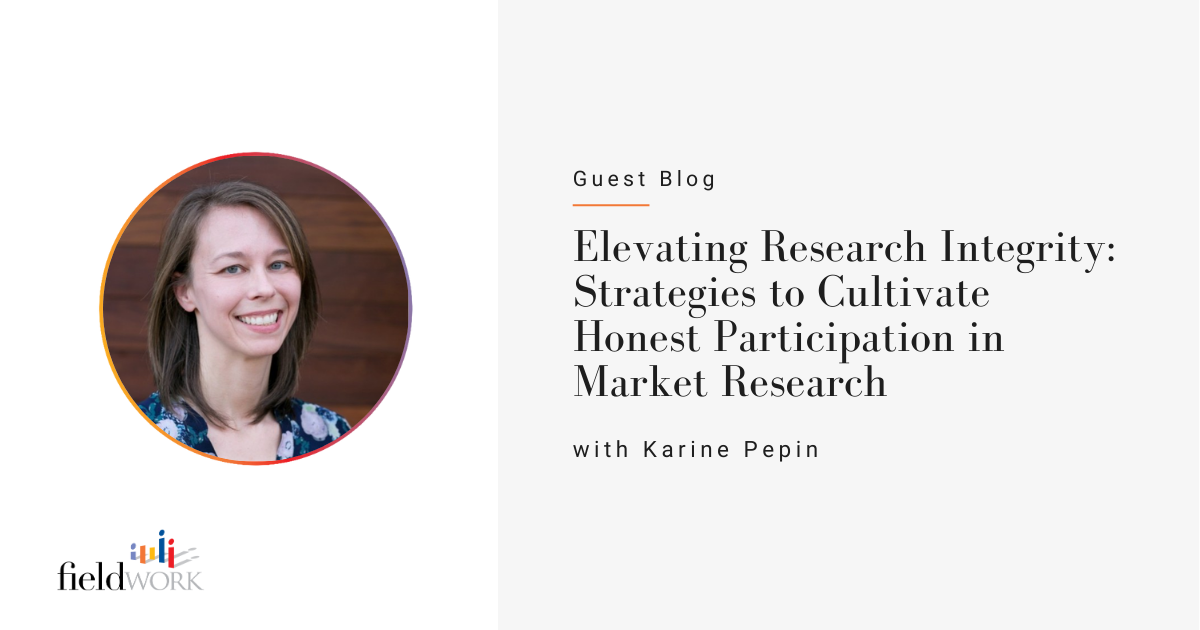The discussion surrounding data quality in both qualitative and quantitative research has gained momentum, particularly in recent years. In contexts where financial gain is at stake, it's inevitable that some individuals will be tempted to test their luck. While 'fraud' is commonly used as a blanket term, the seriousness of the offense varies widely, ranging from sophisticated predatory practices targeting our industry to individuals simply wanting to earn a ‘little extra’ (or ‘beer money’ as some call it).
Understanding the motivations and experiences of research participants is crucial for fostering authenticity. The reality is that monetary incentives play a significant role in people’s willingness to participate in market research. In an ideal scenario, participants would fill out a screener, qualify, complete the task, and receive a fair incentive for their time. In reality, the qualification process is not straightforward. In fact, it is fraught with pain points and frustrations, leading participants to sometimes bend the truth to qualify.
As recruiters and researchers, our research design and practices can help minimize this risk and promote authenticity.
Tips for Fostering Authenticity in Market Research Participants
1. Profile and Target Effectively
From a participant's perspective, qualifying for research studies can often feel like a lottery. Eager participants, keen on sharing their thoughts and opinions to earn some extra cash, find themselves faced with the hurdle of completing a screener. With a high probability of disqualification (e.g., 65%-85% in quantitative online surveys), individuals may be tempted to lie or embellish the truth to increase their chances of securing a spot in the study.
To reduce the risk of participants exaggerating or misrepresenting information, profiling is a powerful tool. Recruiters who maintain detailed profiling information (e.g., demographics, lifestyle, etc.) have the ability to target the right participants instead of relying on the hit-or-miss approach of 'throwing darts'.
Targeting the right individuals helps speed up the recruitment process, alleviates participants' frustration by increasing their likelihood to qualify, and reduces the temptation for participants to resort to dishonesty to gain entry into the research.
2. Design a Robust and Concise Screener
Screeners act as the initial gateway to a study. If a screener divulges the topic or nudges participants to answer in a way that facilitates qualification, it compromises the integrity of the research.
Recruiters and researchers should avoid leading questions (e.g., "Are you a surgeon?") that may prematurely reveal the research topic. Providing comprehensive lists of choices or open-ended questions will help mitigate the risk of deceptive responses from participants.
Screeners should also be concise, focusing solely on gathering essential qualifying information while omitting ‘nice-to-have’ details. It's important to recognize that participants receive minimal or no incentives for completing screeners, so respecting their time demonstrates our appreciation for their participation.
3. Provide Fair Incentives
In quantitative online research, incentives are notoriously low. Honest survey participants on traditional panels often earn less than $1 per hour, especially when factoring in the time spent answering screeners unsuccessfully. This poor value exchange can leave participants feeling undervalued and reluctant to provide their best efforts.
Whether it's quantitative or qualitative research, offering appropriate incentives for the tasks requested is critical for making participants feel valued, thereby encouraging them to give their best. Additionally, ensuring easy and prompt payment is important for maintaining participant satisfaction.
4. Cultivate Trust
In a world where concerns about data privacy abound, it's understandable that some participants with good intentions may hesitate to share personal information. This reluctance can sometimes lead individuals to consider providing inaccurate details in order to protect their privacy.
Building strong relationships with participants takes time and effort, but the benefits are clear. Fostering open communication and demonstrating a commitment to safeguarding their data will create an environment where individuals feel valued and respected, and in turn, are more authentic to themselves.
In it for the Long Haul
Data quality and the participant experience go hand in hand. Working with partners who understand the participant experience in the larger research ecosystem, work hard to mitigate pain points, and build trust with the participants is the key to fostering authenticity and improving data quality.
Karine Pepin | The Research Heads | karine@theresearchheads.com
As a Quirk’s Award winner and a regular contributor to industry podcasts and publications discussing data quality and the participant experience, Karine is a passionate advocate for the power of insights.
While some people say they "fell into" market research, for Karine, it was love at first sight. A lot has happened in the past 25 years, but they haven’t grown apart. In fact, she is more energized than ever, always exploring ways to use AI and ResTech to enhance our work without compromising on quality.







